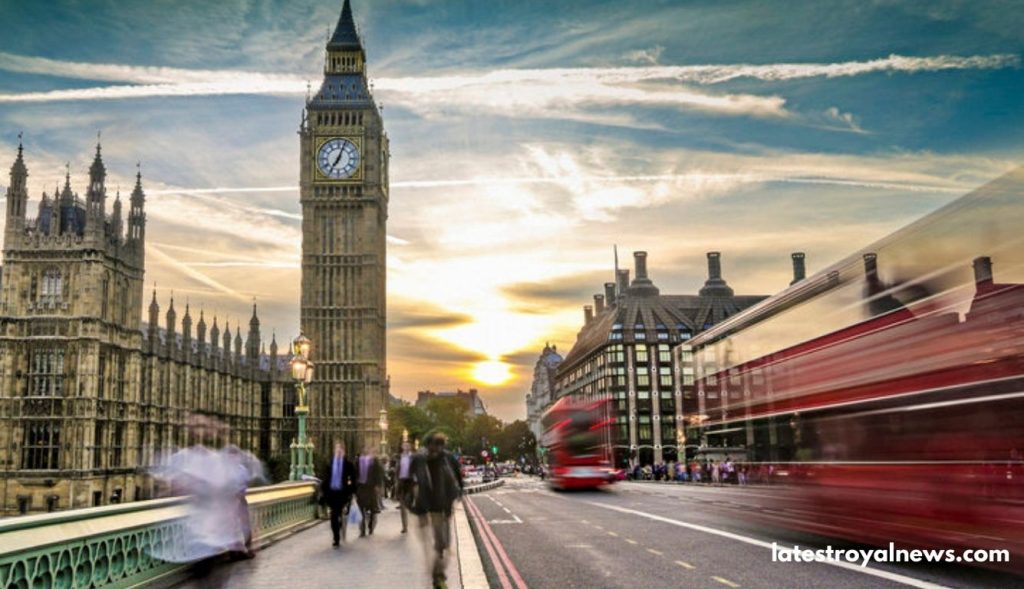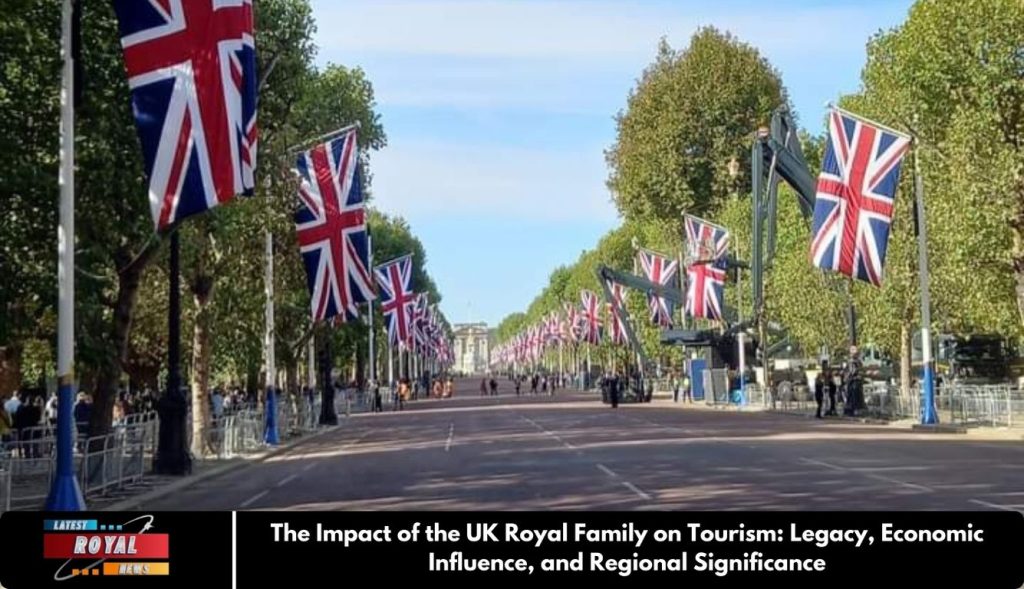The United Kingdom’s Royal Family has long been a symbol of tradition, continuity, and national pride, influencing various aspects of British life. Among the many ways in which the monarchy impacts the country, one of the most prominent is through tourism. From iconic royal residences like Buckingham Palace and Windsor Castle to grand events such as royal weddings and state funerals, the monarchy has become a key driver for attracting millions of visitors to the UK each year. The monarchy’s allure extends beyond just royal fans, drawing tourists interested in experiencing a piece of British history and culture that is uniquely tied to the royal family’s legacy.
The death of Queen Elizabeth II on 8th September 2022, after an unprecedented 70-year reign, marked a turning point in the monarchy’s influence on UK tourism. Her passing sparked a wave of public interest as people around the world reflected on her enduring presence and the broader cultural and symbolic significance of the royal family. As the UK navigates the transition to King Charles III’s reign, the role of the monarchy in shaping national and regional tourism remains a subject of great importance.
This article delves into the profound and far-reaching impact of the UK Royal Family on tourism, exploring both its direct economic contributions and the more subtle cultural and symbolic influences that continue to shape the nation’s tourism landscape.
The Economic Influence of the UK Monarchy on Tourism
The economic impact of the UK Royal Family on tourism is multifaceted, encompassing direct revenue generated from royal attractions, as well as indirect contributions to sectors such as trade, media, and arts. In recent years, estimates have suggested that the total capital value of the UK monarchy has increased from £44 billion in 2012 to £67.5 billion. The annual contribution to the UK economy is estimated at £1.766 billion, factoring in the extensive ripple effects across various industries.
Royal tourism, encompassing visits to royal residences, palaces, and events such as Royal Weddings and state funerals, plays a significant role in these figures. The tourism industry benefits not only from the physical presence of royal landmarks but also from the symbolic influence of the monarchy that shapes international perceptions of the UK.
Royal Tourism: The Cultural and Symbolic Functions
Beyond financial considerations, royal tourism holds deep cultural and symbolic significance. The monarchy represents a connection to the UK’s rich history, traditions, and values, which attract international visitors seeking to experience this heritage. Royal palaces, such as Buckingham Palace and Windsor Castle, are among the most visited attractions in the UK, with tourists flocking from across the globe to witness the splendor and history that these locations represent.
More than just architectural marvels, these sites symbolize the continuity of British traditions and the enduring cultural significance of the monarchy. This unique blend of cultural history and contemporary relevance has solidified royal tourism as a significant pillar of the UK’s global appeal.
Quantifying the Impact: Challenges in Measuring Royal Tourism
Measuring the precise economic impact of the royal family on tourism is challenging due to the intangible and multifaceted nature of their influence. Efforts to quantify the financial contributions of royal tourism often encounter difficulties in isolating the monarchy’s role from other tourism drivers. While statistics show that 60% of overseas visitors to Britain are likely to visit royal-associated sites, and over a third of tourists in London consider Buckingham Palace a must-see, the broader implications of royal tourism remain elusive.
Several factors complicate the measurement process, including fluctuating international events, the seasonal nature of tourism, and the influence of factors like media coverage, which often shifts focus during major royal events such as weddings or jubilees. Nevertheless, estimates suggest that the economic uplift attributed to the royal family’s influence on tourism could exceed £550 million annually.
The Regional Impact of Royal Tourism

While London is the focal point of royal tourism, the monarchy’s influence extends far beyond the capital, benefiting various regions across the UK. Regional tourism opportunities linked to the royal family have become increasingly prominent, particularly in areas where royals reside or have strong historical connections. For instance, Anglesey in Wales experienced a 20% increase in tourism during the time Prince William and Catherine, the Prince and Princess of Wales, resided there. King Charles III’s property in Carmarthenshire, Llwynywermod, showcases the region’s local crafts and materials, offering a unique attraction tied to the monarchy.
Regional tourism agencies have recognized the potential of royal associations, yet these opportunities often remain underutilized in promoting local heritage and attracting visitors. Despite the tendency to focus royal marketing efforts on iconic sites like Buckingham Palace, there is growing interest in leveraging the monarchy’s regional ties to boost tourism outside London.
Royal Residences and the Increasing Accessibility
The changing accessibility of royal residences to the public plays a crucial role in driving regional tourism. As more royal properties open their doors to visitors, these sites become key attractions, contributing to regional economies. Following Queen Elizabeth II’s passing, Balmoral Castle in Scotland, a property historically closed to the public, opened its grounds to visitors for free. This decision is seen as a way to honor the late Queen’s legacy and provide a space for reflection, simultaneously offering a fresh tourism opportunity.
Such moves reflect King Charles III’s growing interest in making royal residences more accessible to the public, enhancing the appeal of regional attractions, and stimulating local economies.
You may also like:
Queen Elizabeth II Memorial: A Groundbreaking Tribute to Her Legacy and Vision for the Future
Vicars’ Close: Preserving a Medieval Gem at the Heart of Wells
Prince William’s Modern Leadership: Transforming the Historic Duchy of Cornwall
The Enduring Influence and Vast Wealth of the World’s Remaining Monarchies
The Role of Royal Events in Boosting Tourism
Major royal events, such as the Queen’s Platinum Jubilee in 2022, royal weddings, and state funerals, have long been a major source of tourism-related revenue. These events capture global attention and result in increased numbers of visitors to the UK. For instance, the wedding of Prince Harry and Meghan Markle in 2018 brought millions of international tourists to London, eager to witness the spectacle and participate in the cultural festivities surrounding the event. Similarly, the coronation of King Charles III in 2023, though impacted by the ongoing global pandemic, generated substantial interest.
The monarchy’s ability to stage high-profile events attracts international media coverage, enhancing the visibility of the UK as a tourist destination. These events provide significant opportunities for the tourism sector, from accommodation and transport to merchandising and event-related activities.
Symbolism, Identity, and the Changing Monarchy
The death of Queen Elizabeth II and the transition of the monarchy to King Charles III undoubtedly had a profound impact on the public perception of the royal family and its role in UK society. The Queen’s passing marked the end of an era, and her absence has created a void in the cultural and symbolic functions that she represented. Her reign was deeply intertwined with the identity of the UK, and for many, her presence symbolized stability, tradition, and national pride.
As King Charles III assumes the throne, the shift in public sentiment and identity will undoubtedly influence tourism, especially in the short term. Visitors who were once drawn to the monarchy’s symbolic presence may find themselves re-evaluating the royal family’s role in UK tourism.
The Legacy of Queen Elizabeth II and Long-Term Tourism Effects
The long-term legacy of Queen Elizabeth II’s reign will likely have a lasting impact on UK tourism, both in terms of emotional and symbolic influence. While it is difficult to predict the precise nature of this legacy, it is clear that her contributions to tourism, culture, and national identity have left an indelible mark. The widespread global mourning and reflection following her death have shown just how deeply her influence was felt, not only within the UK but also across the world. As the monarchy transitions under King Charles III, the future of royal tourism will be shaped by both continuity and change, with regional diversification and increased accessibility offering new opportunities for the tourism industry.
Frequently Asked Questions
How does the UK Royal Family impact tourism?
The UK Royal Family plays a significant role in attracting tourists through royal residences, events, and cultural heritage. Iconic sites like Buckingham Palace and Windsor Castle, as well as high-profile events such as royal weddings and jubilees, draw millions of visitors annually, contributing significantly to the UK’s tourism economy.
What is the economic impact of royal tourism?
The monarchy’s economic impact is considerable, with estimates suggesting the UK monarchy generates £1.766 billion annually for the economy. This includes direct revenue from royal-related attractions, as well as indirect effects on trade, media, and arts. The overall capital value of the monarchy has also been estimated at £67.5 billion.
How does royal tourism benefit regional economies?
Royal tourism benefits regions outside London by increasing footfall to royal-related attractions in places such as Windsor, Scotland, and Wales. For instance, regions like Anglesey and Carmarthenshire have seen tourism boosts due to royal associations, with local heritage sites and royal residences becoming key tourist destinations.
Are royal events significant for tourism?
Yes, royal events such as the Queen’s Platinum Jubilee, royal weddings, and coronations have a profound impact on tourism. These events often lead to an influx of visitors eager to experience the celebrations, and the media coverage they generate elevates the UK’s visibility as a tourist destination.
How has the death of Queen Elizabeth II affected UK tourism?
Queen Elizabeth II’s passing in 2022 has reignited global interest in the monarchy and its symbolic role in British identity. While the immediate economic impact was hard to quantify, her death has led to increased tourism in London, particularly around memorial events, royal residences, and exhibitions reflecting on her reign.
How do royal associations impact local tourism campaigns?
Local tourism campaigns often leverage royal associations to attract visitors. While some regions actively promote their royal connections, others, such as Yew Tree Farm in Borrowdale, refrain from using royal patronage in their marketing materials. The strategic use of royal affiliations is a key tool for enhancing local tourism efforts.
What is the future of royal tourism under King Charles III?
While it is still early to fully assess, King Charles III’s reign may further shape the evolution of royal tourism. With a greater focus on accessibility and regional connections, the monarchy’s influence on tourism is likely to diversify, offering new opportunities to attract visitors to royal estates and events across the UK.
How can royal residences be more accessible to the public?
In recent years, there has been a growing effort to make royal residences more accessible to the public. For example, Balmoral Castle in Scotland, traditionally closed to visitors, has opened its grounds to the public following Queen Elizabeth II’s passing. King Charles III has expressed interest in increasing public access to royal properties, offering a chance for more people to experience the heritage and history of these iconic locations, which in turn can drive regional tourism.
Conclusion
The UK Royal Family remains a cornerstone of British tourism, generating significant economic and cultural benefits. While the death of Queen Elizabeth II represents the end of an era, the monarchy’s influence on tourism is unlikely to diminish in the foreseeable future. The monarchy’s power to attract international visitors, its connection to historic landmarks, and its role in shaping national and regional identities continue to make it a central player in the tourism industry.
As King Charles III’s reign unfolds, it will be fascinating to observe how the monarchy adapts to the evolving demands of the tourism sector, ensuring its lasting legacy as an iconic symbol of British heritage.


